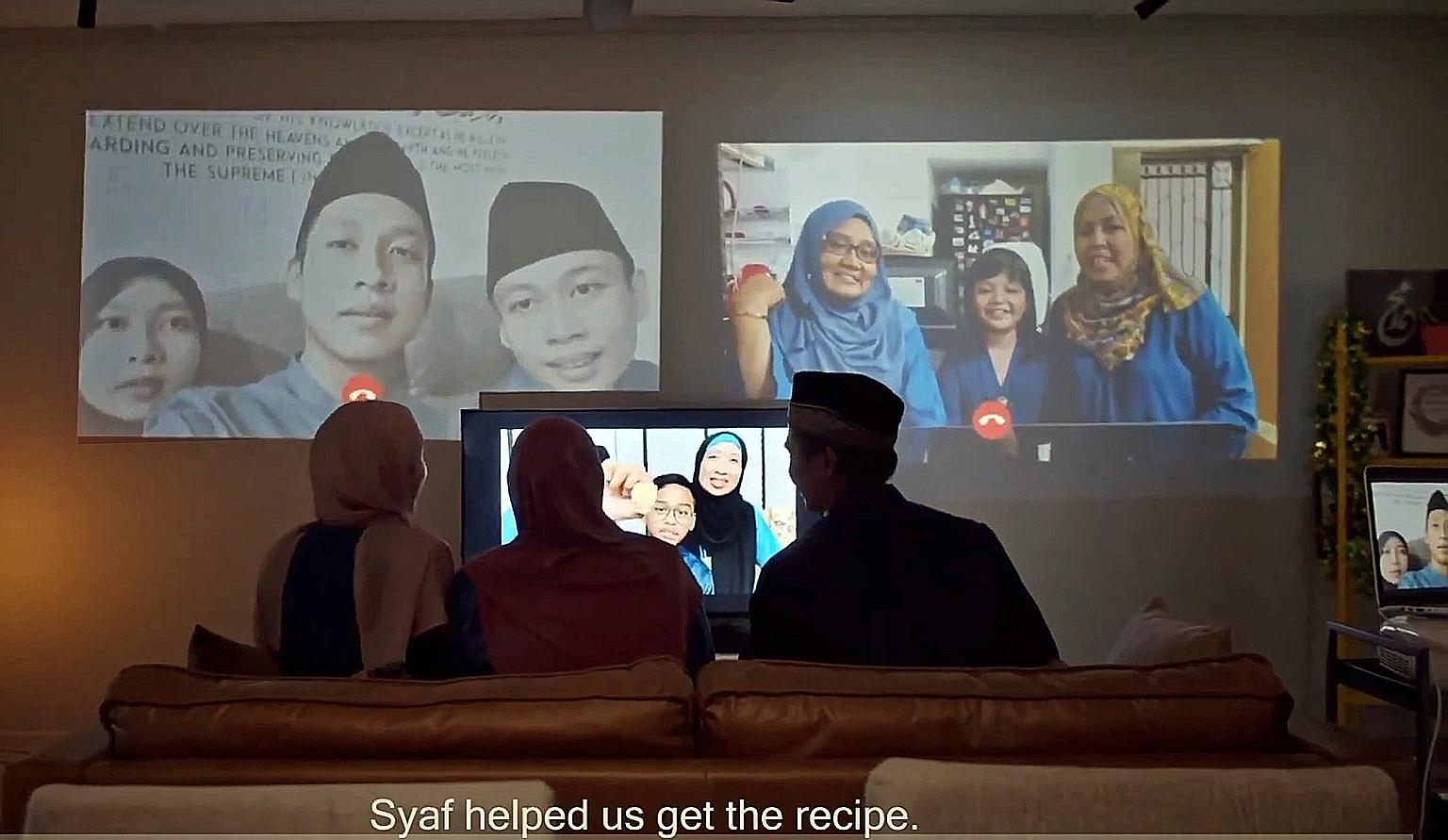No Hari Raya visiting during circuit breaker period: Muis
Instead, Muslims can connect with loved ones online, join prayers virtually
Sign up now: Get ST's newsletters delivered to your inbox

A SalamSG TV livestream on May 15 included clips from a video produced by a group of young Muslim Singaporeans on how technology can feature in this year's Hari Raya celebrations.
PHOTO: SALAMSG TV/YOUTUBE
Hari Raya Aidilfitri is a time when Muslims get together, but next weekend's festivities will take place online and among families at home as Singapore continues to battle the Covid-19 pandemic.
Muslims in Singapore celebrate Hari Raya Aidilfitri, or Hari Raya Puasa, which marks the end of the Ramadan fast, on May 24.
The Islamic Religious Council of Singapore (Muis) yesterday said people should not make visits or hold gatherings - in order to protect their loved ones, especially seniors facing higher risks.
Hari Raya falls during the circuit breaker period, which lasts till June 1, the council noted.
"It is all the more important to take precautions now and adjust to the new norms, so that we can visit our loved ones later when it is safe to do so, in more Hari Rayas to come," Muis added, in announcing plans to help Muslims fulfil their religious duties next weekend.
On the eve of Hari Raya, the takbir - or communal prayer calls - after the last breaking of fast will be led by Mufti Nazirudin Mohd Nasir and various religious teachers. This will be livestreamed via YouTube on SalamSG TV and via the Facebook pages of Muis and mosques.
Dr Nazirudin will then address the community on SalamSG TV, and will be joined by former Mufti Fatris Bakaram as well as President Halimah Yacob as a special guest.
On the morning of Hari Raya, there will be a live takbir via Malay radio station Warna 94.2 FM, as well as online through the Facebook pages of the local mosques.
After the Aidilfitri prayers, Dr Nazirudin will lead a live Hari Raya sermon which will be broadcast over radio and on online channels such as SalamSG TV.
All places of worship, including Singapore's 70 mosques, are closed at the moment to stem the spread of the coronavirus. Circuit breaker measures to curb its further spread came into force on April 7. They were to last till May 4, but were later extended by a month to June 1.
More than 26,000 people in Singapore have been infected with Covid-19, the majority of them foreign workers living in dormitories.
Under the circuit breaker, social gatherings of any size - in homes or public spaces - are not allowed. Under the Covid-19 (Temporary Measures) Act passed in Parliament last month, first-time offenders can be fined up to $10,000 and jailed for up to six months.
While social visits are prohibited, people can still visit elderly relatives to help them with their daily needs, but should take precautions such as observing good hygiene and not visiting if one is unwell.
"Muslims should abide by the national restrictions on gatherings in public and private spaces and therefore refrain from traditional Hari Raya visits and gatherings across households," said Muis yesterday.
"Persons going out to purchase festive items should do so individually and keep their trips as short as possible. Visits to loved ones in different households, especially elderly family members, should be deferred until restrictions on visits are lifted, except where important caregiving is required."
Operations executive Noraini Kasman, 53, told The Straits Times she is "very disappointed and sad" that she cannot visit her friends and family on Hari Raya Puasa.
"This has never happened to us before," said the grandmother of two, who lives with her husband and 21-year-old son. "When you pray (in the mosque) with many people, the atmosphere is very different... But Muis has made the call, and we have to respect that."
Still, she is hopeful that after the circuit breaker period, restrictions will ease and she will be able to visit her relatives when it is still the Islamic month of Syawal.
Singapore is not the only country that will have safe distancing measures in place during Hari Raya.
Saudi Arabia has imposed a lockdown, and while Malaysia is easing restrictions, the country will allow only "small" gatherings of no more than 20 people during visits.
During a virtual press conference yesterday, Minister-in-charge of Muslim Affairs Masagos Zulkifli was asked if there will be more checks on the ground to ensure that the social distancing rules are not flouted. He said people have to "leave it to (their) conscience to make sure visiting is not rampant".
"You would be spreading the virus to your loved ones, the elderly, who are very vulnerable and can succumb to the disease. This must be foremost in our minds, when we decide if we want to go out and visit one another," he said.
"If there are complaints from neighbours that there are crowds in homes, we will have to take action."
On whether restrictions on visiting will be eased after June 1, he said the authorities are still deliberating the matter.
As for provisions for migrant workers, Mr Masagos said the authorities will issue guidance to the imams Muslim workers have chosen.
"We are also working with the joint task force with MOM (Ministry of Manpower) to provide special Hari Raya meals for 200,000 of these migrant workers, regardless of religion."


